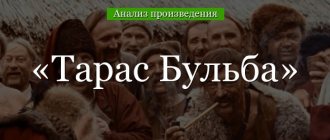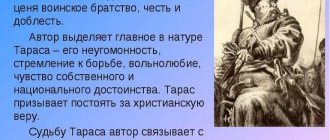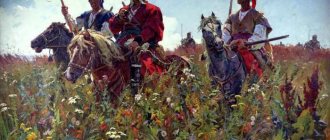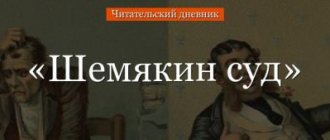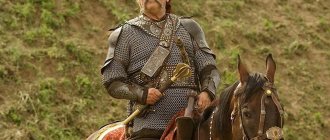A very brief retelling of the story “Taras Bulba”.
Listen to a short retelling of "Taras Bulba".
Taras Bulba's sons, Ostap and Andriy, finish their studies and return to their father's house. The father wants to show them the Cossack life and for this he takes them with him to the Zaporozhye Sich. The guys quickly join the cheerful team, in which the Cossacks drink and party out of idleness.
Watch "Taras Bulba" in 1 minute.
Bulba requires a change of head. The new leadership decides to go to Poland. Dubno is the first to come under attack. The city is besieged, and nearby villages are plundered and burned. The Cossacks do not like such atrocities; they want to fight with an equal enemy.
Andriy, having fallen in love with a Polish girl, betrays his homeland and father. He makes his way to the besieged city to his beloved and remains on the side of the enemy. In one of the battles with the Poles, Taras personally kills his defector son. Ostap is a good warrior, but loses one of the battles and is captured, where he is executed in front of his father. Taras Bulba devotes the rest of his days to revenge for the murder of his son. He himself dies at the hands of the Haiduks.
About the author of the book
Gogol Nikolai Vasilyevich (1809 - 1852) - great Russian writer.
He came from a middle-income landowner family: the Gogols had about 400 serfs and over 1000 acres of land. The writer’s ancestors on his father’s side were hereditary priests, but his grandfather Afanasy Demyanovich left the spiritual career and entered the hetman’s office; It was he who added another Gogol to his surname Yanovsky, which was supposed to demonstrate the origin of the family from the 17th century, known in Ukrainian history. Colonel Evstafy (Ostap) Gogol (this fact, however, does not find sufficient confirmation). Father, Vasily Afanasyevich, served at the Little Russian Post Office. Mother, Marya Ivanovna, who came from the landowner Kosyarovsky family, was known as the first beauty in the Poltava region; She married Vasily Afanasyevich at the age of fourteen. In addition to Nikolai, the family had five more children. The future writer spent his childhood years in his native estate Vasilievka (another name is Yanovshchina), visiting with his parents the surrounding places Dikanka, which belonged to the Minister of Internal Affairs V.P. Kochubey, Obukhovka, where the writer V.V. Kapnist lived, but especially often in Kibinsy, the estate of a former minister, a distant relative of Gogol on the side of D. P. Troshchinsky’s mother. The early artistic impressions of the future writer are connected with Kibintsy, where there was an extensive library and a home theater. Another source of the boy’s strong experiences were historical legends and biblical stories, in particular, the prophecy told by his mother about the Last Judgment with a reminder of the inevitable punishment of sinners. Since then, Gogol, in the words of researcher K.V. Mochulsky, constantly lived “under the terror of retribution from beyond the grave.”
A summary of the story “Taras Bulba” in detail by chapter.
Chapter 1. Return of Andriy and Ostap home from Kyiv.
Old Taras Bulba and the kind mother greet their sons Ostap and Andriy. Young Cossacks are returning from the Kyiv Academy. Mother really missed the children, but their father Taras immediately gathers and takes his mature sons to the Zaporozhye Sich in order to quickly introduce them to the course of Cossack life.
Chapter 2. The road to Khortitsa.
Author: Nikolai Vasilievich Gogol
On the way to the Zaporozhye Sich, the riders did not talk - each thought about his own. My father recalled his youth and military victories. Ostap recalled how difficult his years of study at the Academy were.
Andriy thought about his adventurous adventures during his studies - how he liked a beautiful Polish girl, and he broke into her bedroom at night. The young lady was not afraid of the unexpected guest for long, and became friends with Andriy. And after an adventurous date, he safely got out of the Polish woman’s house with the help of the lady’s maid.
The travelers drove their horses for a long time across the endless steppes and arrived at the battle, where everything was filled with freedom, and life flowed smoothly.
Chapter 3. Changing the Koshevoy.
For a whole week, Ostap and Andriy and their fellow Cossacks buzzed in the Zaporozhye Sich. Taras didn’t like this, he wanted to teach his sons the art of fighting, and not drinking. But the Koshevoi saw no point in equipping the Cossacks for a campaign. Taras Bulba figures out how to replace the intractable Koshevoy. He arranges a big drinking party, after which the Cossacks elect Kirdyaga as the new leader.
Chapter 4. Cossacks go to war on Polish lands.
Taras Bulba and the new Koshevoy decide to send the Cossacks to fight. Kirdyaga is thinking of sending the Cossacks against the Turks, but alarming news comes - the Poles executed the hetman and the colonel against the Ukrainians. Then the Cossacks hastily began to prepare for a campaign against the Poles. Yankel, a Jew and merchant, rides with the army.
Chapter 5. Cossacks on Polish lands. Siege of Dubno.
Summer. The Cossack army marched through Polish cities. The prosperous city of Dubno was besieged. After dark, the lady's maid, with whom Bulba's son is in love, comes to Andriy and tells him about the monstrous famine in the city. The Cossack's beloved turned out to be the daughter of the governor of Dubno. He decides to go along the secret passage to besieged Dubno to bring bread to the lady.
Chapter 6. Andriy's betrayal.
The youngest son of Taras makes his way to Dubno, meets his lady and loses his head from love for her. He decides to remain on the side of the Poles, renouncing his father and brother. At the same time, fresh forces arrived in Dubno. The Poles became bolder and launched a night attack on the Cossacks.
Chapter 7. Ostap was appointed chieftain.
In the morning, Yankel reports unpleasant news - the youngest son of Taras has gone over to the side of the enemy. A heavy battle begins, in which many were killed - both Poles and Cossacks. The battle ended in nothing, but in the process Ostap was appointed chieftain. The eldest son of Taras proved himself to be a courageous warrior and a good ataman to his Cossacks.
Chapter 8. Attack of the Tatars.
The Cossacks learn that the Tatars attacked the Zaporozhye Sich. Part of the army returns home to repel the attackers, and part remains near Dubno, where Taras Bulba becomes Kosche.
Chapter 9. Taras Bulba did not forgive the betrayal of his own son.
As soon as some of the Cossacks left the siege, the Poles decided to give battle to the thinned army of the conquerors. Many people on both sides were killed in the battle. Taras Bulba meets Andriy, fighting on the enemy side. He cannot forgive the betrayal and shoots his son in front of Ostap. Andriy falls dead. The Poles win the battle, capture Ostap and wound Taras Bulba.
Chapter 10. Taras Bulba goes in search of Ostap.
Taras Bulba goes to the Zaporozhye Sich to treat his wound. Having recovered, he enters into an agreement with Yankel, and he secretly takes him to Warsaw in search of his eldest son.
Chapter 11. Death of Ostap.
Upon arrival in Warsaw, Taras learns that the next day the execution of the Cossacks will take place and his son is on the sad list. The father wants to save his son from execution, but his plan fails. Together with the crowd, he is forced to oversee the preparations for the execution. Ostap is looking for his father and he lets him know that he is nearby.
Chapter 12. Revenge for my son.
The young hetman of Ukraine soon made peace with the Poles. Taras Bulba does not agree with the truce. He and his loyal Cossacks continue to raid Polish settlements. So he takes revenge for the execution of his son. The Poles are gathering an army to pacify Bulba. The battle lasts for four days. Bulba is captured and sentenced to death by burning at the stake. Dying, the old Cossack glorifies Orthodoxy and the power of the Russian people.
Main characters
To better navigate the plot and understand the meaning of the work, it is worth briefly familiarizing yourself with the description of the characters. In the center of the plot of the story, Gogol shows the following characters:
- Taras Bulba is a very strong man with an unyielding character. He is smart and has a powerful will. A Cossack loves his life and his homeland. This man is the leader of the Cossack army. His character is dominated by honesty, justice, courage and rage towards his enemies. He is always ready to defend the weak and repel invaders. Taras's main goal is to win the independence of his country. Therefore, he boldly goes to the enemy’s camp in order to be present at Ostap’s execution. His integrity and confidence prevail over his father's feelings, and he personally kills his second son for betraying his homeland.
- Ostap, the son of Taras, inherited stubbornness, disobedience, love of free life and the desire for freedom from his father. This is a very persistent person who has achieved success in learning thanks to being demanding of himself. Among his comrades he is a leader, a reliable and loyal friend. There is no meanness in him, betrayal is alien to him. The characterization of the main character “Taras Bulba” shows that he is a brave and courageous person, he fearlessly goes into battle. Once captured, the guy shows calm and maintains pride, honor and dignity even during execution.
- Andriy is the second son of the main character, a gentle, refined nature, impressionable and emotional. The hero strives for love and shows courage and fearlessness in battle. Feelings for a Polish girl greatly change the character’s views on life, worldview and priorities. Because of her, he betrayed his comrades, sided with the enemy and died at the hands of his own father.
Gogol placed the members of the ataman’s family at the center of the plot, describing in detail not only their feelings and experiences, but also the relationship between the head of the family and his sons. These historical events carry an important meaning for the younger generation, showing the value of principles and addressing the problem of fathers and sons.
Briefly about the history of the creation of the story “Taras Bulba”.
Gogol’s literary work “Taras Bulba” from the “Mirgorod” cycle takes its reader into the events of the 17th century. At the same time, the author often mentions the 15th century, attributing the date of birth of the main character to this time and emphasizing, with this moment, the fantastic nature of his story.
The idea of creating “Taras Bulba” originated with Nikolai Vasilyevich in the 30s of the 19th century, and the history of work on this literary work is truly interesting. In his work, the writer, painstaking by nature, turned to two types of sources of inspiration and information:
- To historical sources, including information not published anywhere, such as memoirs, letters, personal archives of ordinary people;
- By artistic sources, we mean Ukrainian folklore: songs, thoughts, etc.
The events drawn from historical facts would not have looked poetic and dry without the influence of folk art on everyday details, plot and structure in Gogol’s text. Thanks to Gogol's appeal to songs, the artistic language of the work is unusually melodious and lyrical, sparkling with bright epithets and comparisons.
Gogol worked on the story for about 10 years. The author rewrote his work about eight times, increased the volume from nine to twelve chapters, adding texture to the characters, adding details to their stories, and enhancing the battle scenes. Nikolai Vasilyevich was not satisfied with the final result.
As an educated person, with a heart for the history of the people, Gogol understood the importance of the past, but it is still not worth classifying the story “Taras Bulba” as historically accurate. The text of the work, in addition to facts, contains a lot of fantasy, hyperbole and contradictions, which does not detract from the artistic value of the literary work.
Content
- 1 Author of the reader's diary
- 2 Title and author of the book
- 3 Time of creation of the work
- 4 Theme of the work
- 5 Main characters
- 6 Plot
- 7 General impression of the work, personal perception
- 8 Cover illustration
- 9 About the author of the book
- 10 About film adaptations
- 11 Promotional video (if available)
- 12 Favorite Quotes
- 13 Interesting facts
- 14 Links to sources of information
- 15 Read Book Word Cloud
- 16 Audiobook
- 17 Illustrating a book with soundtracks
Time and place of action
The action of the story “Taras Bulba” takes place in the realities of Ukrainian history, approximately in the 16th – first half of the 17th centuries. The historical period is not specified in the text; only the general context of the era is used. This was the time when the lands on the territory of Ukraine were owned by the gentry, that is, noble Poles.
Free Ukrainian people—Cossacks—lived in the Dnieper region; in different years there were military-administrative formations known under the general name Zaporozhye Sich. Some researchers believe that the events of 1637–1638 could have served as the basis and source of inspiration for the author.
The text indicates the time of birth of the main character - the 15th century. This fact conflicts with some other details, which indicates the conventionality of the time of action and the inappropriateness of linking “Taras Bulba” to a specific era. The work is not positioned as historical.
Mentions of specific geographical names indicate the location of the action.
Khortytsia is an island in the waters of the Dnieper, now part of the city of Zaporozhye, historically one of the centers of the Zaporozhye Sich, a fort was founded here in 1555.
Dubno is a Ukrainian city, now part of the Rivne region, which was controlled by the Poles in the 17th century.
Some of the events take place in the capital of the Polish state, Warsaw, and the city of Krakow also appears in the text.
